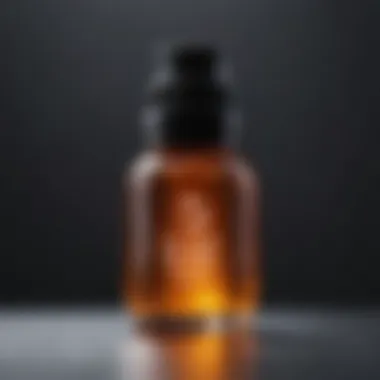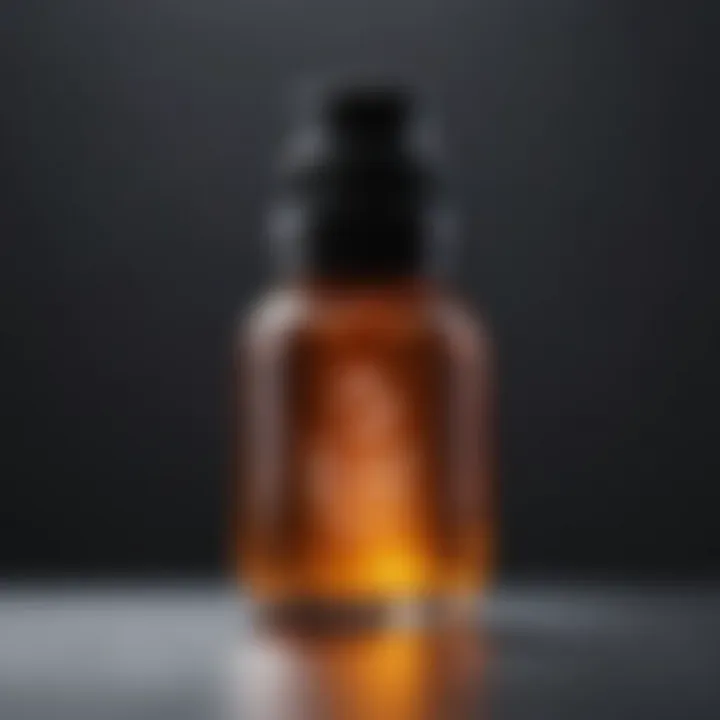Identifying the Ideal Oils to Prevent Hair Fall


Intro
Hair fall is a common concern affecting many women, regardless of age. Finding the right oil to incorporate into a hair care routine can play a pivotal role in mitigating this issue. The landscape of hair health products is vast, with numerous oils claiming to promote hair growth and reduce hair fall. However, understanding the unique properties and benefits of each oil is crucial in making informed decisions. This guide aims to navigate through the effective oils that can aid in preserving hair health and preventing hair fall.
The importance of selecting the right oil cannot be overstated. Not all oils are created equal; their different compositions provide varying benefits, influenced by both scientific evidence and traditional wisdom. By examining these oils in depth, we equip ourselves with the knowledge necessary to enhance our hair care regimens effectively.
Tips and How-Tos
Choosing the right oil for hair care requires attention to individual hair types and needs. Here are some tips to keep in mind when selecting an oil:
- Consider Your Hair Type: Different oils cater to different hair types. For instance, lightweight oils like argan oil work well for fine hair, while thicker oils such as castor oil are beneficial for thicker textures.
- Assess Your Hair Needs: Identify whether you need hydration, nourishment, or strengthening. Oils like coconut and olive oil are excellent for deep nourishment, while jojoba oil can help in balancing scalp oils.
- Frequency of Use: Determine how often you plan to use the oil. Some oils can be used daily, while others may be better suited for weekly treatments.
"The right oil can transform your hair health, shifting it from lackluster to lively."
Haircare and Styling Basics
An effective hair care routine goes beyond just applying oil. Here are foundational steps to establish a healthy hair care regimen:
- Cleansing: Start with a gentle shampoo, avoiding sulfates which can strip essential oils.
- Conditioning: Follow up with a conditioner, focusing on the ends where damage is often more pronounced.
- Oil Application: Apply your chosen oil either as a pre-wash treatment or overnight. Warm the oil slightly for enhanced penetration.
- Styling: Use heat protectant if styling with heat tools. Minimizing heat exposure is key to reducing hair fall.
Incorporating these practices can greatly influence hair health and reduce the risk of hair fall. By understanding the significance of oil selection and proper care techniques, women of all ages can confidently navigate the path to achieving healthier hair.
Understanding Hair Fall
Understanding hair fall is crucial in finding effective solutions for one of the common concerns faced by many individuals. This section lays the groundwork for how various factors contribute to hair loss, thus setting the stage for an informed approach to using oils in hair care. Understanding these elements helps in tailoring specific products and practices to address individual issues, thereby potentially mitigating hair fall effectively.
Defining Hair Fall
Hair fall is often defined as the excessive shedding of hair. While it's normal to lose a certain amount of hair daily, anything beyond this could indicate a problem. Hair fall can manifest in various forms such as thinning, bald patches, or widespread loss. Usually, these symptoms serve as warning signs prompting individuals to seek remedies or interventions.
Common Causes of Hair Fall
Several factors contribute to hair fall, ranging from nutritional deficiencies to genetics. Recognizing these causes is vital to address the issue effectively.
Nutritional Deficiencies
Nutritional deficiencies play a significant role in hair fall. Insufficient intake of essential vitamins and minerals can weaken hair follicles, leading to increased shedding. Iron, zinc, and vitamins A and E are particularly critical in maintaining healthy hair. A well-balanced diet incorporating these nutrients can be beneficial in combating hair loss. Therefore, understanding this aspect allows individuals to make better dietary choices to support hair health.
Genetic Factors
Genetic factors are another prominent cause of hair fall. Conditions like androgenetic alopecia, often referred to as male or female pattern baldness, are hereditary. This genetic predisposition means that individuals with a family history of hair loss might experience it themselves. Understanding this aspect emphasizes that while remedies exist, some factors are beyond control.
Stress and Lifestyle Impact
Stress and lifestyle choices significantly impact hair health. Chronic stress elevates hormone levels, such as cortisol, which can disrupt the hair growth cycle. Moreover, poor lifestyle habits, such as inadequate sleep and lack of exercise, can exacerbate the issue. Recognizing this allows individuals to not only seek medical remedies but also incorporate stress-relief techniques and lifestyle adjustments to improve their overall hair health.
Key Takeaway: Understanding the multifaceted causes of hair fall empowers individuals to take informed steps towards effective prevention and treatment.
The Role of Oils in Hair Care
Oils play a significant role in the realm of hair care. They are not just simple products; they are vital components that contribute to the overall health and vitality of hair. The importance of oils in hair care can be broken down into several key aspects: moisture retention, nourishment, protection against damage, and promoting hair growth.
Oils offer deep hydration. They penetrate the hair shaft, reducing dryness which is a common cause of hair fall. This moisture retention is crucial in maintaining healthy hair. Furthermore, oils contain essential nutrients that are beneficial for the hair and scalp. It is this nourishment that fortifies the hair, making it less prone to breakage.
Additionally, many oils have protective properties against environmental factors, such as pollution and UV rays. They create a barrier that shields the hair from damage, thereby preventing further hair loss.
It is also worth noting that using oils as a part of regular hair care can stimulate blood circulation in the scalp. This increased circulation promotes hair growth and helps in maintaining a healthy scalp. Therefore, integrating oils into one’s hair care regimen is not just a luxury; it is a necessary task for anyone looking to mitigate hair fall effectively.
Historical Use of Oils in Hair Treatment
Historically, various cultures have utilized oils for the care and treatment of hair. Ancient Egyptians used castor oil as a remedy for baldness and to promote hair growth. In India, coconut oil has long been revered for its moisturizing properties and is commonly used in traditional Ayurvedic practices. This historical use of oils demonstrates their value, transcending beyond mere trends.
Besides, many oils were recognized for their ability to heal and nourish both hair and scalp. These time-tested remedies have been passed down through generations, further solidifying the role of oils in hair care routines.


Scientific Insights into Oil Efficacy
Chemical Composition
The chemical composition of each oil varies significantly, which greatly affects their efficacy in hair care. One key characteristic of many beneficial oils is their high concentration of fatty acids. For instance, coconut oil is rich in lauric acid, which has the unique ability to penetrate hair strands more effectively than other oils. This characteristic makes coconut oil a popular choice for deep conditioning treatments.
Moreover, oils like argan oil contain antioxidant properties due to their vitamin E content. This can help protect the hair from oxidative stress, which is a contributing factor to hair loss and damage. Therefore, the specific chemical makeup of these oils plays a crucial role in determining their effects and benefits for hair health.
Absorption Properties
Absorption properties are another critical aspect in understanding how oils function in hair care. Different oils have varying abilities to penetrate the hair shaft. For example, jojoba oil mimics sebum, the natural oil produced by our scalp. This allows it to be absorbed easily, promoting moisture without leaving a greasy residue. This high absorption rate is one reason jojoba oil is often recommended for those experiencing hair fall.
On the contrary, some oils may not absorb as well, leading to build-up on the scalp. This can cause issues such as clogged pores, which might counteract the benefits of oil application. Understanding these absorption characteristics can help individuals select oils that not only provide nourishment but also enhance their overall hair care routine.
In summary, the role of oils in hair care is profound and multifaceted. Their historical significance, combined with scientific understanding of chemical properties and absorption characteristics, make them essential for effective hair fall mitigation.
Popular Oils Used for Hair Fall Prevention
The choice of oil for preventing hair fall is crucial. Hair health often hinges on the right nutritional and topical support. Natural oils offer essential nutrients that can nourish both the hair and the scalp. They are not just aesthetic improvements but rather a route towards maintaining healthy hair. The properties of these oils can influence everything from the scalp health to hair texture. In the following sections, we will explore specific oils, their properties, and how they contribute to hair fall prevention.
Coconut Oil
Properties and Composition
Coconut oil is unique due to its medium-chain fatty acids, primarily lauric acid, which has a high affinity for hair protein. This characteristic enables the oil to penetrate the hair shaft rather effectively. Its structure allows for deep conditioning without leaving a greasy residue. The saturated fats in coconut oil strengthen and moisturize the hair. Because of this, it is often regarded as a premium choice for hair nourishment.
How it Affects Hair Health
Coconut oil impacts hair health by reducing protein loss from the hair strands. This results in less damage and breakage over time. Regular application can lead to shinier and stronger hair overall. However, over-application can lead to buildup, so moderation is key.
Argan Oil
Nutrient Profile
Argan oil is loaded with vitamins E and A, along with essential fatty acids. These nutrients work together to promote healthy hair and scalp conditions. Vitamin E provides antioxidant properties, protecting hair from environmental damage while nourishing each strand. This oil is popular for its lightweight texture, making it suitable for various hair types.
Impact on Scalp Health
It plays a vital role in maintaining scalp health, preventing dryness and irritation. A well-moisturized scalp is less prone to flaking and helps create a better environment for hair growth. Argan oil's antifungal properties may also aid in combating dandruff, thus supporting overall hair health.
Olive Oil
Essential Fatty Acids
Olive oil contains a wealth of essential fatty acids, primarily oleic acid. This structure facilitates hydration and penetration into hair tissues. The fatty acids help to moisturize the scalp while nourishing the hair follicles. This can help ameliorate conditions that lead to hair fall, fostering a healthier scalp environment.
Benefits for Texture and Moisture
The use of olive oil results in softer and more manageable hair. It helps in reducing frizz and adds a natural shine. While beneficial, one must be cautious of using too much, as it can weigh hair down and lead to a greasy look.
Jojoba Oil
Similarity to Natural Oils
Jojoba oil closely resembles sebum, the natural oil produced by the scalp. This similarity allows it to absorb efficiently without clogging pores. It is non-greasy and has moisturizing properties that can help balance scalp oil levels. Because of its gentle nature, it is suitable for all hair types.
Potential to Reduce Hair Fall
Research suggests that jojoba oil may support hair growth by minimizing hair loss. Its moisturizing properties help to sustain the health of hair follicles. While many find it beneficial, results may vary depending on individual scalp conditions and hair types.
Castor Oil
Rich in Ricinoleic Acid
Castor oil is distinguished by its high ricinoleic acid content. This unique component is believed to improve blood circulation to the scalp, fostering a healthier environment for hair growth. Its viscosity means it should be used sparingly, as too much can be challenging to wash out.


Effect on Hair Growth Cycle
The oil has been noted for potentially promoting hair growth by stimulating the hair follicles. Users often report thicker hair over time. However, excessive use can lead to a heavy buildup that may hinder rather than help the hair growth process.
Rosemary Oil
Stimulation of Blood Circulation
Rosemary oil is well-known for its ability to promote blood circulation. Increased circulation leads to better nutrient supply to hair follicles, which is essential for strong hair growth. A few drops massaged into the scalp can significantly enhance overall scalp health.
Antimicrobial Properties
This oil features inherent antimicrobial properties, which can prevent scalp issues, such as dandruff and infections. A clean and healthy scalp is vital for minimizing hair fall. However, it should be used diluted due to its potent nature.
Application Methods for Oils
Understanding the application methods for hair oils is essential to maximizing their benefits. The correct use of oils can significantly enhance their effectiveness in preventing hair fall. Different techniques and timings of application come with specific advantages that cater to various hair types and conditions. The oil penetration into the hair shaft and scalp is critical for achieving optimal results.
Pre-Wash Treatments
Pre-wash treatments involve applying oil to the hair and scalp before shampooing. This method creates a protective barrier against harsh cleansing products and can nourish the hair from the roots before the washing process.
Massaging Techniques
Massaging the scalp while applying oil is an important aspect of pre-wash treatment. This technique aids in stimulating blood circulation, promoting a healthier scalp environment. The essential characteristic of massaging techniques is the gentle pressure applied to the scalp, which increases blood flow to the hair follicles.
The tactile experience can improve relaxation while enhancing the uptake of oil nutrients. A significant advantage of this method is the dual benefit of nourishing hair with oil and encouraging stress relief. Conversely, improper technique can lead to hair breakage, hence caution is necessary.
Frequency and Duration
Frequency and duration of oil application are key factors in achieving hair health. It is often recommended to conduct pre-wash treatments a few times a week. Regular application assists in maintaining the scalp's moisture balance and promoting hair vitality.
A unique feature of this approach is that it varies according to individual hair types. For example, those with oily hair may benefit from lighter oils and less frequent application, while drier hair types may thrive with more intensive treatments. One challenge lies in balancing the length of time the oil remains on the scalp, as leaving it for too long could attract dirt and lead to a greasy scalp.
Post-Wash Applications
Post-wash applications involve using oils after washing hair, integrating them into your daily hair care routine. This allows for additional moisture retention and protection.
Leave-In Treatments
Leave-in treatments are a popular choice in post-wash applications. The main advantage of leave-in oils is that they provide ongoing hydration and protection throughout the day. These treatments can help in detangling hair and reducing frizz, which is especially beneficial for damaged or curly hair types.
They are usually light and do not weigh the hair down. A potential drawback may include the necessity for trial and error to find the right formulation that suits individual hair needs without adding excessive greasiness.
Serums and Sprays
Serums and sprays represent another effective post-wash application strategy. These products are often formulated with concentrated oil extracts, providing targeted treatment for specific hair concerns, such as split ends or dryness. The lightweight texture of serums makes them easy to distribute evenly throughout the hair.
Their unique feature lies in their ease of use; a small amount can address significant issues effectively. However, users should be mindful of the formulation, as certain serums can lead to build-up over time, necessitating regular cleansing.
Effective application of oil—both pre- and post-wash—can significantly influence the overall health of hair and scalp.
Understanding and applying these methods carefully can go a long way in mitigating hair fall and promoting a healthier mane.
Potential Limitations and Considerations
Understanding the limitations and considerations when using oils for hair fall prevention is crucial. Each oil, while boasting unique benefits, may offer different responses based on individual hair types and scalp conditions. It is important to acknowledge that not all oils work universally, and the effectiveness can vary. This section highlights potential issues, ensuring informed decisions for optimal hair care.
Allergies and Reactions
The use of natural oils can lead to allergic reactions in some individuals, manifesting as redness, itching, or irritation on the scalp. Essential oils, such as rosemary or tea tree, often have strong active compounds that can trigger sensitivities. Testing oils on a small skin patch before widespread application is a recommended practice. Additionally, discontinuing use immediately at the first sign of irritation is paramount.
Important Considerations:


- Identify sensitivity: Look for possible reactions when starting with a new oil.
- Consult a professional: Seeking advice from a dermatologist can be beneficial for those with sensitive skin or allergies.
- Use lighter oils: Oils such as jojoba can be milder options, reducing the risk of reactions.
Overuse and Scalp Issues
While oils are generally advantageous, overusing them can lead to scalp build-up. Excess application may tend to clog hair follicles, potentially hindering hair growth and contributing to greasy hair. This emphasizes the significance of moderation in use. For instance, using a few drops of oil as a leave-in treatment is often adequate.
Guidelines for Proper Use:
- Limit frequency: Stick to a routine that includes oil application one to two times weekly.
- Adequately cleanse: Ensure proper washing techniques to remove excess oil. Focusing on exfoliating the scalp can support balance.
- Monitor hair condition: If hair appears weighed down, it may be time to reevaluate the amount and frequency of application.
Acknowledging the potential limitations and considering individual responses is necessary for benefiting from oil applications and maximizing hair health.
Integrating Oils into a Comprehensive Hair Care Routine
Integrating oils into a hair care routine is crucial for those aiming to address hair fall effectively. Oils provide moisture, nourishment, and protection; thus, they can promote overall hair health. A considered approach to oil usage enhances beneficial outcomes while minimizing potential downsides. Understanding how to effectively combine oils with other hair care products is essential.
Complementary Products
Shampoos and Conditioners
Shampoos and conditioners play a significant role in a hair care routine focused on stopping hair fall. They cleanse the scalp, remove buildup, and prepare hair for subsequent nourishment. A good shampoo does not strip away natural oils, ensuring a balanced scalp environment.
It is beneficial to choose sulfate-free shampoos. These products preserve essential moisture and prevent further hair dryness, which can lead to breakage. Conditioners reinforce this by providing hydration and improving manageability. Look for conditioners with ingredients such as shea butter or argan oil, as they add extra moisture and nutrients to the hair, making it more resilient.
The unique feature of these products is their ability to combine cleansing with conditioning. However, if used improperly, such as over-washing, they can lead to excessive dryness or irritation, which may counteract oil benefits.
Hair Masks
Hair masks represent another vital component for comprehensive hair care. They deliver concentrated treatment for the strands and scalp, often containing higher levels of oils and active ingredients than regular conditioners. Hair masks can deeply penetrate the hair shaft, promoting elasticity and reducing breakage.
Using hair masks once a week can significantly impact hair health. Popular options might include masks featuring coconut oil or hibiscus extracts—both of which are known for their repairing properties. The unique characteristic of hair masks lies in their ability to offer intensive treatment, making them ideal for addressing specific concerns like damage or dryness.
However, it is important to avoid overuse, as this may lead to product buildup, negating the desired effects of the oils and other treatments.
Dietary Considerations
Nutrients for Hair Health
Nutrients play a key role in maintaining healthy hair and can complement oil usage. Essential vitamins, such as biotin and vitamin E, have shown positive effects on hair strength and growth. A diet rich in these nutrients supports not only hair health but overall bodily wellness too.
Focusing on the inclusion of foods like nuts, seeds, and leafy greens can provide necessary vitamins. The unique feature of these nutrients is their ability to enhance hair vitality from within, addressing root causes of hair fall. An unbalanced diet may lead to deficiencies that affect hair, so maintaining nutritional balance is imperative.
Hydration and Overall Wellness
Hydration directly affects hair health. Drinking enough water supports cellular function, including those related to hair growth. Well-hydrated hair is less prone to breakage and is more likely to retain its shine and moisture.
Moreover, maintaining good overall wellness is vital. Regular exercise, stress management, and a balanced lifestyle contribute positively to hair health. This holistic approach combines hydration with healthy living, fostering a stronger foundation for combating hair fall.
In summary, integrating oils into your routine should not be an isolated act. It is most effective when oils are combined with complementary products like shampoos and conditioners, and supplemented by a nutrient-rich diet. This comprehensive strategy promotes better scalp health and minimizes hair fall, creating an informed pathway to enhanced hair vitality.
Concluding Thoughts
In concluding this article, it is essential to understand the significance of oils in the journey towards mitigating hair fall. The benefits derived from various oils are not only based on tradition but also on scientific validation. Utilizing oils such as coconut, argan, and castor has shown promise in promoting healthier hair. Each oil possesses unique properties that can contribute to strengthening hair follicles and enhancing overall scalp health.
Recapitulating Oil Benefits
Each type of oil discussed provides a range of benefits that target hair fall.
- Coconut Oil: Its lauric acid content penetrates the hair shaft, reducing protein loss which is crucial for hair strength.
- Argan Oil: Rich in antioxidants, it nourishes the scalp and may stimulate healthier hair growth.
- Olive Oil: It is praised for styling and moisture retention, enhancing hair's sheen.
- Jojoba Oil: Mimics the natural sebum produced by our skin, maintaining moisture balance while preventing dryness.
- Castor Oil: Known for its ricinoleic acid, it enhances blood circulation to the scalp, potentially increasing hair growth.
- Rosemary Oil: Its role in stimulating blood circulation aids in follicular health, combating hair thinning.
These oils, when chosen wisely, can complement each other, creating a versatile approach to hair health.
Encouraging Personal Experimentation
Discovering what works best for your hair often involves trial and error. Each individual's hair is unique, influenced by factors like genetics, diet, and environmental conditions. Therefore, personal experimentation is key.
Here are a few steps to approach this:
- Patch Test: Always perform a patch test to rule out any allergic reactions before widespread use.
- Start Small: Begin with one oil to monitor its effects before combining different oils.
- Observe Results: Take note of changes in hair texture and growth patterns over time.
- Consult Professionals: If unsure, seeking advice from a dermatologist or a trichologist can lead to informed choices.
Engaging in this process will empower individuals to take charge of their hair health, allowing for tailored routines that can yield satisfying results.







